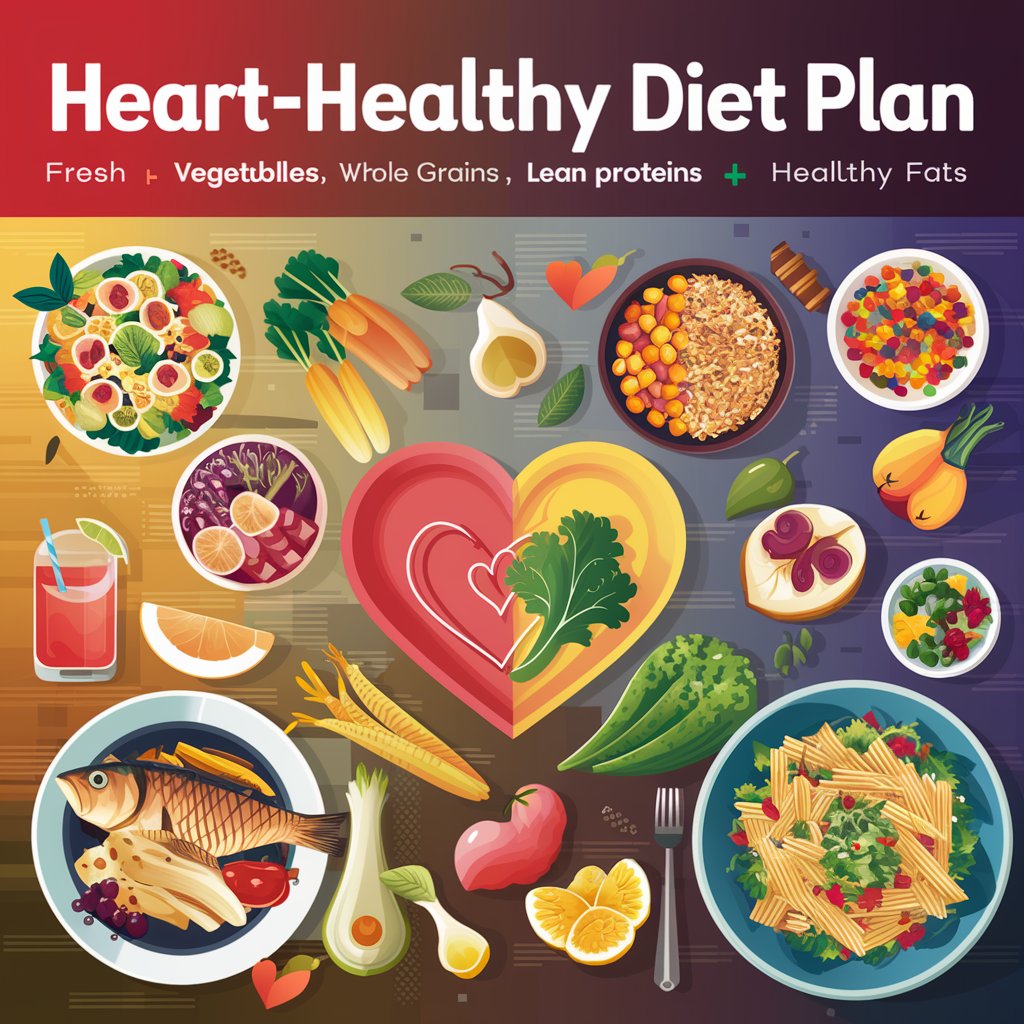Heart-Healthy Diet Plans: is a topic that deserves attention. With heart disease remaining one of the leading causes of death worldwide, understanding how diet plays a crucial role in maintaining cardiovascular wellness is essential. What we eat can significantly impact our heart’s function and overall health.
Choosing the Heart-Healthy Diet Plans right foods can help ma nagger blood pressure, lower cholesterol levels, and reduce inflammation—all vital factors for a healthy heart. In this article, we’ll explore six diets that not only promote heart health but are also enjoyable to follow. Whether you’re looking to overhaul your eating habits or simply want some new ideas for healthier meals, these options offer something for everyone. Let’s dive into the best dietary strategies designed to keep your ticker ticking strong!
The Mediterranean Diet
The Mediterranean Diet is more than just a meal plan; it’s a lifestyle. Originating from countries bordering the Mediterranean Sea, this diet emphasizes fresh ingredients and simplicity.
Fruits, vegetables, whole grains, and legumes are staples. Olive oil serves as the primary fat source, rich in heart-healthy monounsaturated fats. Fish takes center stage too, offering omega-3 fatty acids that support cardiovascular health.
Red meat is limited while poultry and dairy are consumed in moderation. This creates a balanced approach without deprivation.
Herbs and spices replace salt for seasoning, adding flavor without compromising health benefits. Sharing meals with family or friends also plays an important role in this way of eating.
Research consistently shows that following the Mediterranean Diet can lower risks of heart disease while promoting weight loss and overall well-being. It’s not just food; it’s an invitation to embrace culture through nutrition.
DASH Diet
The DASH diet, which stands for Dietary Approaches to Stop Hypertension, focuses on reducing blood pressure through nutrition. It’s not just about cutting salt; it emphasizes a holistic approach to eating.
This plan encourages the consumption of fruits and vegetables, whole grains, lean proteins, and low-fat dairy products. These foods are rich in nutrients that support heart health.
By limiting saturated fats and added sugars, followers can significantly improve their overall well-being. The DASH diet also promotes healthy sources of fat like nuts and seeds.
One exciting aspect is its flexibility. You can tailor your meals based on personal preferences while still adhering to the core principles. This makes it easier for many people to stick with the plan long-term.
Adding flavor without excessive sodium is achievable through herbs and spices—making each meal both tasty and heart-healthy.
Plant-Based Diets
Plant-based diets have gained significant attention for their potential heart health benefits. This eating pattern emphasizes fruits, vegetables, whole grains, nuts, and seeds while minimizing animal products.
Research shows that consuming a variety of plant foods can lower cholesterol levels and reduce blood pressure. Rich in fiber and antioxidants, these foods help combat inflammation—an essential factor in heart disease.
Transitioning to a plant-based diet doesn’t mean strict vegetarianism or veganism; it’s about incorporating more plant-derived meals into your routine. Think hearty salads loaded with beans or veggie stir-fries packed with colorful ingredients.
Furthermore, this type of diet is versatile and enjoyable. You can experiment with flavors from different cuisines while nourishing your body. With endless options available, making healthier choices becomes an exciting culinary adventure rather than a chore.
Low-Carb Diets
Low-carb diets have gained popularity for their potential heart health benefits. By reducing carbohydrate intake, these diets encourage the body to burn fat for fuel.
Foods like lean meats, fish, eggs, and non-starchy vegetables take center stage. These options are not only filling but also rich in nutrients that support cardiovascular function.
With fewer carbs, blood sugar levels may stabilize. This can help lower insulin resistance and reduce the risk of developing type 2 diabetes—a significant factor in heart disease.
Many people find they lose weight on low-carb plans. Weight loss can lead to improved cholesterol levels and reduced high blood pressure, both crucial for heart health.
However, it’s essential to choose healthy fats such as avocados or nuts rather than processed options. Balancing this diet with adequate fiber is also key for digestive health while keeping your ticker happy.
The Flexitarian Diet
The Flexitarian Diet is all about balance. It encourages a primarily plant-based lifestyle while still allowing for occasional meat and animal products. This approach makes it easier for many to transition towards healthier eating habits.
At its core, the diet emphasizes fruits, vegetables, whole grains, and legumes. These foods are rich in essential nutrients that support heart health. They help lower cholesterol levels and reduce the risk of heart disease.
Flexitarians can enjoy meals featuring lean meats or fish occasionally. This flexibility helps individuals create a sustainable way of eating without feeling deprived.
Another perk? The variety keeps things interesting! You’re more likely to explore new recipes and ingredients when you embrace a more adaptable approach to your plate.
With focus on nutrient-dense foods, it’s easy to nourish your body while savoring flavors from various cuisines. The Flexitarian Diet truly marries health with enjoyment.
Recommendations for a Heart-Healthy Diet Plan
Creating a heart-healthy diet plan can be both enjoyable and rewarding. Incorporating elements from the Mediterranean Diet, DASH Diet, plant-based diets, low-carb options, or the Flexitarian approach can lead to substantial benefits for your cardiovascular health.
Plant-based diets not only promote heart health but also offer diverse meal options that are often rich in nutrients. For those who prefer flexibility while still focusing on healthier choices, a Flexitarian diet provides balance without strict restrictions.
Conclusion: Heart-Healthy Diet Plans
Consider your lifestyle and preferences when choosing a diet. If you love vibrant flavors and fresh ingredients, the Mediterranean approach might resonate with you. On the other hand, if you’re looking to reduce sodium intake without sacrificing taste, the DASH Diet could be an excellent fit.
Remember that moderation is key no matter which dietary path you choose. It’s essential to listen to your body and consult with healthcare professionals when making significant changes to your eating habits. By prioritizing whole foods—fruits, vegetables, lean proteins—and healthy fats into your daily meals while limiting processed foods and sugars; you’ll be taking proactive steps towards better heart health.
Whichever route you take toward enhancing your diet will contribute positively to maintaining strong cardiovascular wellness over time. Embrace this journey as more than just a change in food—consider it an investment in yourself for years to come.
FAQs:
What is a heart-healthy diet plan?
A heart-healthy diet plan focuses on consuming foods that are low in saturated and trans fats, cholesterol, added sugars, and sodium. The goal is to reduce the risk of heart disease and promote overall cardiovascular health through balanced, nutrient-dense meals.
What are the key components of a heart-healthy diet?
The key components include:
- Emphasizing fruits, vegetables, whole grains, lean proteins, and healthy fats
- Limiting red meat, processed meats, high-fat dairy products, and foods high in added sugars and sodium
- Incorporating foods rich in omega-3 fatty acids, such as fatty fish, nuts, and seeds
- Staying hydrated by drinking plenty of water
How does a heart-healthy diet benefit the heart?
A heart-healthy diet can help lower cholesterol levels, blood pressure, and inflammation – all of which are risk factors for heart disease. It also supports maintaining a healthy weight and managing conditions like diabetes, which further reduce the risk of cardiovascular problems.
What are some examples of heart-healthy foods?
Examples include:
- Fruits and vegetables (e.g., berries, leafy greens, citrus fruits)
- Whole grains (e.g., oats, quinoa, brown rice)
- Lean proteins (e.g., chicken, fish, legumes)
- Healthy fats (e.g., olive oil, avocados, nuts, seeds)
How can I transition to a heart-healthy diet?
Start by making small, sustainable changes to your eating habits. Gradually incorporate more whole, unprocessed foods into your meals and snacks. Plan your meals in advance to ensure you have heart-healthy options on hand. Seek support from your healthcare provider or a registered dietitian to develop a personalized plan.
Are there any specific diets that are considered heart-healthy?
Yes, some heart-healthy diet patterns include the Mediterranean diet, the DASH (Dietary Approaches to Stop Hypertension) diet, and the plant-based diet. These emphasize the consumption of whole, minimally processed foods and limit the intake of saturated and trans fats, added sugars, and sodium.
ABOUT US:https://techlicss.com/

